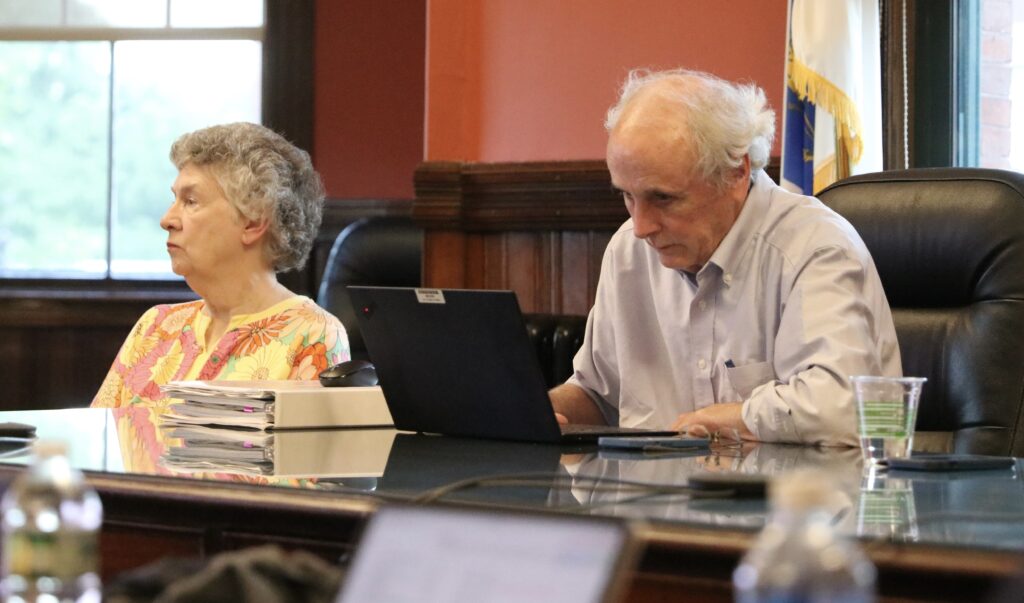Photo: The Municipal Skating Rink Building Committee at the public forum held Wednesday, May 22. Town Moderator Mike Widmer (center) led the event
With a critical Town Meeting vote on the future of the proposed Municipal Skating Rink two weeks away, some much-needed good news for the beleaguered rink project came in the form of a $750,000 state budget appropriation shepherded to the town by State Sen. Will Brownsberger.
The announcement of the last-minute state budget earmark came the same day as a community forum held by the Municipal Skating Rink Building Committee on Wednesday, May 22, at Town Hall. It was also just two days after the Belmont Select Board approved a Special Town Meeting to vote to close a $2.1 million expense overage in the project’s original $29.9 million price tag.
“We got some good news related to the state budget,” Rink Building Committee member Tom Caputo told the two dozen residents at the meeting. While a final state budget won’t be approved by July, “if the town approves the natural refrigerants for the rink [at the Special Town Meeting], the town can count on receiving $750,000 from the state to cover the expenditure.”
The new rink will be equipped with a $650,000 CO2 refrigerant system. Popular in Canada, the carbon dioxide technology, while nearly twice as expensive as the standard Freon gas-based system, is considered environmentally superior. Due to its impact on global warming, Freon is expected to face strict limits or outright bans in the next decade.
If funds are left over after the CO2 system is paid for, it’s possible the rest can be carried to “cover other environmental compliance costs,” said Caputo, adding that Brownsberger will come before the Special Town Meeting “to share this in person.”
It is still unclear what percentage of the state funding can be used to reduce the rink’s shortfall. After Wednesday’s meeting, Town Administrator Patrice Garvin said her office and the Select Board – which has the ultimate authority on how much town funds will be requested in the article – are creating a plan that will allocate the greatest amount to the project.
When answering a question on Wednesday by Town Meeting member Jack Weis (Precinct 1) if receiving the state funding will reduce the deficit from $2.1 to $1.4 million, Caputo said, “[i]t’s safe to say a significant portion of it will be used to reduce the ‘ask’ of town’s funds.”
Wednesday’s funding announcement is the first bit of positive news for the building committee, which has been scrabbling for the past three months to drain the $5.1 million in red ink.
Cost drivers skyrocketed
At the Monday, May 20 Select Board meeting, Building Committee Chair Mark Haley and members Caputo and Dante Muzzioli reiterated how the building project is facing a shortfall. According to Haley, the rink project was affected by unprecedented increases in material and labor costs, unforeseen toxic waste discoveries, site complications, and schedule delays.
The most significant impact of the escalating expenses in the past year resulted from a cost explosion in materials, labor, and services between September 2023 and February 2024, which saw the cost skyrocket to $35.1 million. According to Haley, the rink’s top four cost drivers include:
- $740,000 in General Requirements, including general contractor Skanska’s labor,
- $700,000 for site work,
- $550,000 in additional costs for concrete and
- $450,000 for masonry work.
When you add a few more line items that saw double-digit increases, the project experienced a rise of $3.4 million to the bottom line “in just trade costs and labor,” Haley said.
Faced with a need to cut costs quickly, the building committee began a value engineering process. But unlike most construction projects, an athletic facility doesn’t have much excess to cut: Haley said the building is “basically a box” with a few rooms and mechanical areas.

After the revision, the committee approved two significant changes: the main lobby will be removed, reducing the structure by about 2,500 sq. ft., and the proposed solar array that would supply power to the facility will not be installed, saving $1.2 million.
On the plus side, Option A will have all the programming supporters promised in the original design: four locker rooms to replace those lost in the razing of the White Field House, recreational storage, bathrooms that can be used when the rink is not in use, a skate rental/sharpening shop, a concession stand, and four dressing rooms.
Having value-engineered a total of $3.3 million in savings, the building committee discussed with town officials helping to foot the remaining shortfall. Garvin advised the Select Board an inactive town account named after the insurance settlement from a fire at the former Kendall School is available as a source. The $2.1 million account was created to meet future capital needs, which is seen as an appropriate use for the rink.
If the Special Town Meeting rejects the June 10 article, Haley said it’s now clear to observers that a barebones facility will not attract the support of the committee or the community to move forward.
“There is no Option B. It’s either the rink we promised or nothing,” said Haley after Wednesday’s meeting.